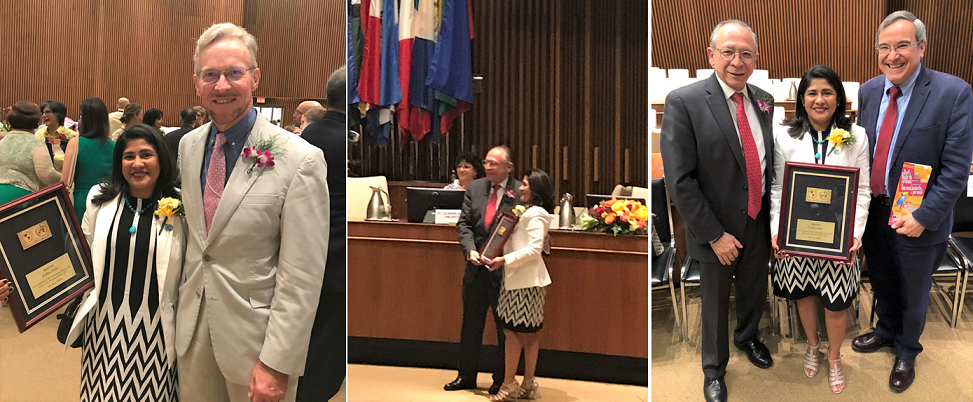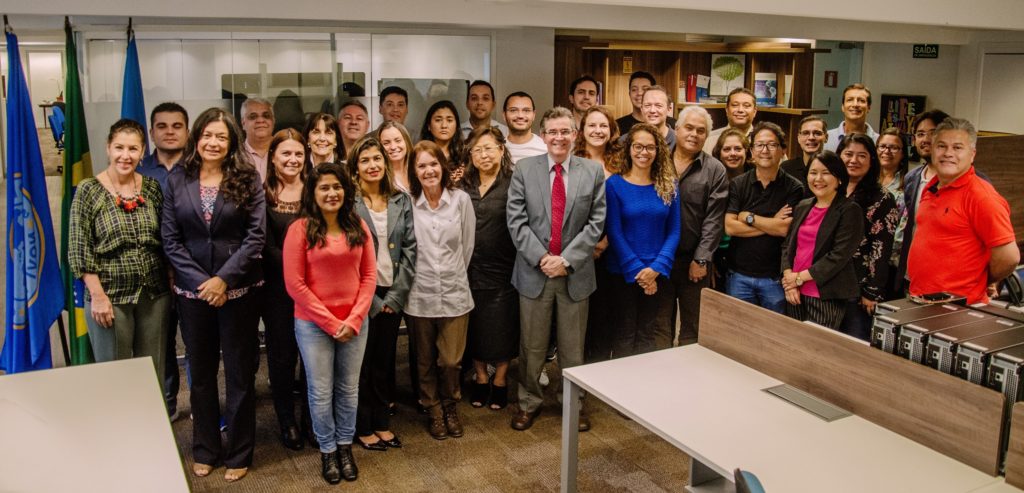The Latin American and Caribbean Center for Health Sciences Information (BIREME) received the Outstanding Team Award from the Pan American Health Organization/World Health Organization (PAHO/WHO) for its achievements during the 2016-2017 biennium. The Awards and Acknowledgements Program, coordinated by the Human Resources Department, allows the participation of all individuals and teams that provide services for the Organization and who are recognized for their achievements in favor of the Organization’s mission.
The award ceremony took place on June 26, 2018 at PAHO/WHO Headquarters in Washington D.C., United States of America, and BIREME was represented by Cícera Maria dos Santos, Administrative Assistant. It was her first time in the United States, and she is very happy, motivated and thankful for the institutional opportunity as well as for the professional and personal learning experience.
According to Dr. Diego González, Director of BIREME, “the recognition that the Center receives today is well deserved, because in this biennium BIREME has been reinvented, modernized and repositioned, having completed 50 years on March 3, 2017. The anniversary was celebrated throughout the year with the participation of institutional partners, users, collaborators, former directors and other supporting actors”.
 The 2016-2017 biennium was marked by the change of BIREME’s facilities, on April 2016, to a new, privately owned space, after 49 years in a University Campus in São Paulo, Brazil. Visits to potential locations were carried out previously, as well as feasibility studies and cost and benefit analysis, always keeping in mind the well-being of all the personnel.
The 2016-2017 biennium was marked by the change of BIREME’s facilities, on April 2016, to a new, privately owned space, after 49 years in a University Campus in São Paulo, Brazil. Visits to potential locations were carried out previously, as well as feasibility studies and cost and benefit analysis, always keeping in mind the well-being of all the personnel.
The entire process was effectively coordinated with PAHO/WHO Headquarters and PAHO/WHO Brazil. BIREME’s functioning was not interrupted, allowing the fulfillment of its activities and the development of its projects, products and services in the context of its historical technical cooperation for the democratization of access to scientific and technical health information in the countries of Latin America and the Caribbean.
The new institutional framework, in implementation by its Statute, in force since 2010, and its new facilities with an open spaces concept, inaugurated in February 2017, facilitated the continuity of cooperative work with 37 countries and 2,000 institutions within and outside the Region.
It is worthy of noting that BIREME’s Biannual Work Plan 2016-2017 (BWP 16-17) was composed of 4 initiatives, 28 Projects or Products and Services and 173 Activities. It was oriented by Programs and Budgets aligned to PAHO’s Strategic Plan, which, in turn, was linked to WHO’s General Work Plan 2014-2019 through its priority topics, to the Sustainable Health Agenda for the Americas 2030 (ASSA2030), to the Sustainable Development Goals (2030 Agenda) and to the Health Agenda for the Americas. Moreover, the BWP considered the priorities of access to information indicated in the Cooperation Strategies of the Countries of the Region and the recommendations of the Center’s Governance Committees: Advisory Committee and Scientific Committee, which held sessions in 2017.
 The development and management of BIREME’s technical and administrative cooperation in the context of the BWP 16-17 are supported by effective internal controls and systems that reflect the data in the WD/PMIS effectively implemented in the Center through training and access to the learning objects of PAHO/WHO. Regular meetings are also held twice a month to exchange information and experiences in order to meet the needs of BIREME’s main institutional partners, including the Ministério da Saúde do Brasil (Ministry of Health of Brazil), the Secretaria do Estado da Saúde de São Paulo (Secretary of Health of the State of São Paulo, SES-SP) and the Secretaria Municipal de Saúde de São Paulo (Secretary of Health of the Municipality of São Paulo, SMS-SP), ensuring alignment with the policies and procedures of PAHO/WHO. This was and continues to be recognized by the Executive Management team of PAHO/WHO, which participated in different activities with BIREME in the last biennium.
The development and management of BIREME’s technical and administrative cooperation in the context of the BWP 16-17 are supported by effective internal controls and systems that reflect the data in the WD/PMIS effectively implemented in the Center through training and access to the learning objects of PAHO/WHO. Regular meetings are also held twice a month to exchange information and experiences in order to meet the needs of BIREME’s main institutional partners, including the Ministério da Saúde do Brasil (Ministry of Health of Brazil), the Secretaria do Estado da Saúde de São Paulo (Secretary of Health of the State of São Paulo, SES-SP) and the Secretaria Municipal de Saúde de São Paulo (Secretary of Health of the Municipality of São Paulo, SMS-SP), ensuring alignment with the policies and procedures of PAHO/WHO. This was and continues to be recognized by the Executive Management team of PAHO/WHO, which participated in different activities with BIREME in the last biennium.
BIREME has an organizational structure of governance, management and operation aligned to the effective implementation of its biannual work plans, within the framework of its technical cooperation for the access and management of health information and knowledge. In this way, it has been perfecting its internal environment to motivate constant learning as well as the development of competencies at different levels.
 During the biennium, regional projects were developed with most of the technical areas of Headquarters. It is worth mentioning BRISA (Base Regional de Informes de Evaluación de Tecnologías en Salud de las Américas – Regional Database for Health Technology Assessment Reports for the Americas), Human Resources in Health, Legislation in Risk Factors of Non-Transmissible Chronic Diseases, among many others. Sub-regional projects such as CARPHA for the English-speaking Caribbean were developed; ties were strengthened for joint work with many of the PAHO/WHO Representations in the countries, giving special attention to key countries. The Global Index Medicus was coordinated, interprogrammatic projects such as Traditional Medicine were developed, and the cross-cutting axes of PAHO (gender, ethnicity, human rights and equity) were incorporated to the DeCS (Descriptors in Health Sciences); new products were developed, directed to the end user of the information, with emphasis on Primary Health Care.
During the biennium, regional projects were developed with most of the technical areas of Headquarters. It is worth mentioning BRISA (Base Regional de Informes de Evaluación de Tecnologías en Salud de las Américas – Regional Database for Health Technology Assessment Reports for the Americas), Human Resources in Health, Legislation in Risk Factors of Non-Transmissible Chronic Diseases, among many others. Sub-regional projects such as CARPHA for the English-speaking Caribbean were developed; ties were strengthened for joint work with many of the PAHO/WHO Representations in the countries, giving special attention to key countries. The Global Index Medicus was coordinated, interprogrammatic projects such as Traditional Medicine were developed, and the cross-cutting axes of PAHO (gender, ethnicity, human rights and equity) were incorporated to the DeCS (Descriptors in Health Sciences); new products were developed, directed to the end user of the information, with emphasis on Primary Health Care.
Besides formal trainings supported by PAHO’s Human Resources Department, with topics such as teamwork, emotional intelligence, elements for building alliances, communication, diversity and systemic vision, the Center promotes permanent integration activities for the constant exchange of knowledge, experience and information, such as: the monthly Coffee with Ideas encounter, during which the main strategic activities of the month are reviewed with acknowledgment to the staff that promoted them, and new ideas, project results and even training activities are presented; and the Work Gymnastic, carried out in partnership with the Universidade Paulista twice a week. The entire staff of the Center participates in these actions, in order to respond to changes in the institutional environment and for the effective alignment of the activities of its technical cooperation and management program.
For its commitment to the health science community to disseminate its activities, innovations and progress, BIREME continues to be present at the main events on the field and has intensified communication actions, with the institutional page, social networks (Facebook and Twitter) and the PAHO/WHO intranet. In addition, in 2016, BIREME launched a new communication channel for its users, institutional partners, PAHO, and the general public: the ‘BIREME Bulletin”, a news information page on technical cooperation actions with the countries of the Region, new products, services and testimonials. The BIREME Bulletin is available in Portuguese, Spanish and English and is also sent by email to partner organizations, libraries and documentation centers, teaching and research institutions, government agencies, international organizations, as well as researchers, professors, graduate and postgraduate students, among others. It aims to disseminate the methodologies and technologies used by BIREME to continue fulfilling its mission of giving visibility, access, quality, use and impact to health information.
“For the results achieved and, above all, for the quality of the teamwork, PAHO/WHO recognizes the exceptional contributions of a functional and inter-programmatic team such as BIREME has been demonstrating”, stated Dr. Diego González Machín, Director of the Center.